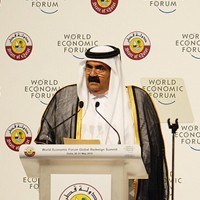One of the most intriguing aspects of the new political dynamics of the Arab Middle East is the decision by the tiny Gulf kingdom of Qatar to throw its full support behind the controversial Muslim Brotherhood in the contest for the future of the region. The choice by a monarchy to support a populist movement always looked like a gamble. But now, two years into what some still call the Arab Spring, with Egypt’s Brotherhood-dominated government scrambling to keep the country from spinning out of its control, the bet by Qatar’s emir looks riskier than ever.
Evidence of Qatar’s backing for the Brotherhood is plentiful. The small but fabulously wealthy monarchy has stood visibly at the forefront of international support for the uprisings.
Qatar’s emir, Sheikh Hamad bin Khalifa al-Thani, helped mobilize the international intervention in Libya and even sent hundreds of troops to help the rebels, favoring the Islamists among them. Qatar also stood beside the Syrian rebels before other Arab countries did, organizing support for the anti-Assad uprising and, once again, tilting in favor of Islamist factions inside the opposition. Qatar has been the strongest, deepest-pocketed financier for the government of Egypt since the rise of the Brotherhood to power there, piling billions of dollars worth of loans at the feet of President Mohammed Morsi’s floundering government, whose handling of the country’s severe financial crisis could make the difference between success and failure for the Brotherhood’s foray into Egyptian politics.

